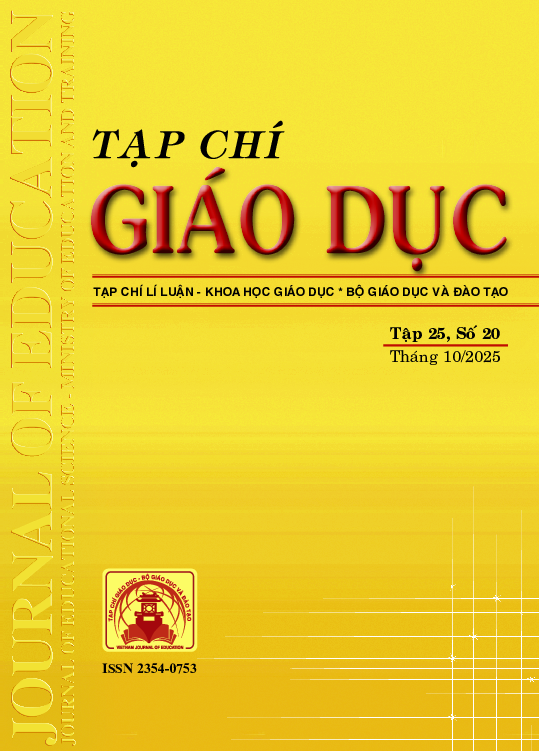Thực trạng sử dụng trí tuệ nhân tạo (AI) của giáo viên phổ thông Việt Nam
Tóm tắt
Artificial intelligence (AI) is becoming an important tool to support education with growing popularity at all education levels. Understanding teachers’ current use of artificial intelligence is essential for effectively exploiting this technology in schools. This survey of 34,571 secondary school teachers aims to describe how and to what extent AI is applied in educational contexts. The findings indicate that most teachers have used AI, with similar usage rates across demographic groups. Its main applications include designing teaching activities, creating lesson plans, and designing assessment materials. Notably, most teachers learn about AI through self-study. These results confirm that AI has become a popular support tool for teachers and highlight the urgent need for educational institutions to develop incentive mechanisms, evaluate effectiveness, and share implementation experiences, thus promoting teaching innovation amid digital transformation.
Tài liệu tham khảo
Bezjak, S. (2024). The future of artificial intelligence in classrooms: Perspectives of upper-secondary school teachers in Slovenia. Journal of Contemporary Educational Studies, 75(4), 72-87.
Chen, R., Lee, V. R., & Lee, M. G. (2025). A cross-sectional look at teacher reactions, worries, and professional development needs related to generative AI in an urban school district. Education and Information Technologies. https://doi.org/10.1007/s10639-025-13350-w
Delgado, N., Carrasco, L. C., De La Maza, M. S., & Etxabe-Urbieta, J. M. (2024). Aplicación de la Inteligencia Artificial (IA) en Educación: Los beneficios y limitaciones de la IA percibidos por el profesorado de educación primaria, educación secundaria y educación superior. Revista Electrónica Interuniversitaria De Formación Del Profesorado, 27(1), 207-224. https://doi.org/10.6018/reifop.577211
Kurshumova, D. (2024). Educational horizons: Mapping the terrain of artificial intelligence integration in Bulgarian educational settings. In Proceedings of the Sixth International Conference on Computational Linguistics in Bulgaria (pp. 150-156).
Lê Anh Vinh, Bùi Thị Diển, Lê Quang Quân, Vũ Văn Luân (2023). Khả năng thực hiện bài kiểm tra định kì môn Toán và môn Ngữ văn cấp Trung học của công cụ ChatGPT: Kết quả nghiên cứu và một số khuyến nghị ban đầu. Tạp chí Khoa học Giáo dục Việt Nam, 19(2), 1-10.
Lê Anh Vinh, Đỗ Đức Lân, Nguyễn Hoài Nam, Lê Quang Quân, Bùi Thu Hương, Nguyễn Minh Hải, Vũ Văn Luân, Lê Lan Anh, Vũ Kim Chi, Lương Đình Hải (2025). Khung năng lực trí tuệ nhân tạo dành cho học sinh phổ thông Việt Nam. Tạp chí Khoa học Giáo dục Việt Nam, 21(7), 1-8.
Lê Anh Vinh, Trần Mỹ Ngọc (2024). Tác động của trí tuệ nhân tạo (AI) đối với hệ thống giáo dục toàn cầu và giáo dục Việt Nam. Tạp chí Khoa học Giáo dục Việt Nam, 20(5), 1-11.
Nguyen, G., Nguyen, N., & Giang, N. T. H. (2022). Situation and proposals for implementing artificial intelligence-based instructional technology in Vietnamese secondary schools. International Journal of Emerging Technologies in Learning (iJET), 17(18), 53-75. https://doi.org/10.3991/ijet.v17i18.31503
Quyet, C. B., & Minh, N. B. (2024). Using AI tools in learning English - Experimental research in Vietnam. Journal of Ecohumanism, 3(4), 1203-1214. https://doi.org/10.62754/joe.v3i4.3651
Quyet, C. B., Minh, N. B., & Anh, N. P. (2024). Using Artificial intelligence tool in studying English skills in Vietnam - an experimental research for Vietnamese high school students. Journal of Ecohumanism, 3(6), 1883-1894. https://doi.org/10.62754/joe.v3i6.4144
Simeunović, M. (2024). Overview and implementation of artificial intelligence in the improvement of educational process. Journal of Scientific & Industrial Research, 83, 544-556. https://doi.org/10.56042/jsir.v83i5.3192
Tải xuống
Đã Xuất bản
Cách trích dẫn
Số
Chuyên mục
Giấy phép

Tác phẩm này được cấp phép theo Ghi nhận tác giả của Creative Commons Giấy phép quốc tế 4.0 .












